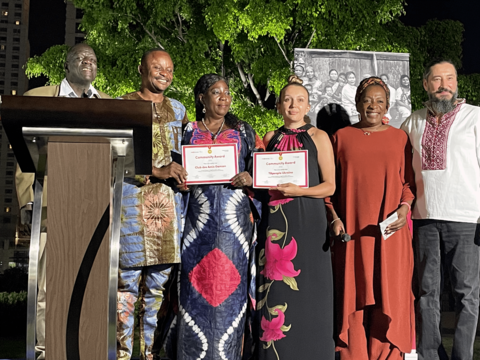10 November 2022, Bangkok, Thailand - In the first of its kind, the Community Summit, organized by the Stop TB Partnership, mobilized more than 160 Challenge Facility for Civil Society (CFCS) and country-level Stop TB Partnership (STP) platform partners from over 35 countries to join forces and strategize on how to amplify their voice and ensure tuberculosis (TB) is placed high on the international political agenda. The Summit was also an opportunity to strengthen the position of CFCS as an important mechanism for capacity building in sustainable community-led approaches in TB.
With the aim to inform, mobilize and coordinate TB communities for strategic engagement ahead of the United Nations High-Level Meeting (UNHLM) in 2023, a series of panel discussions and group exercises were conducted. Over the course of the week, the participants reflected on the outcomes of the previous UNHLM 2018 and came up with innovative ideas for community advocacy in the run-up to next year’s UNHLM 2023. The aim of this exercise was to ensure strong participation and engagement from global Heads of State and Government.
Affected communities and civil society partners also engaged in the consultations for the next edition of the Deadly Divide: TB Commitments Vs TB Realities community accountability report that will be developed as an important advocacy tool to set out key priorities for the UNHLM 2023.
“This Summit represents for me the “meeting of the year”, a coming together of family members and friends, and seeing you in such large numbers discussing the way forward to end TB, gives me immense hope. Gone are the times when we were unable to identify more than a handful of civil society and communities’ representatives.” said Dr. Lucica Ditiu, Executive Director of the Stop TB Partnership who addressed the participants virtually.
“The participation and leadership of the affected community and the civil society is central and non-negotiable if we are to be successful in ending TB and it is impressive to see that things are moving and we see a transformation of the TB response. Even though we do not have the financial resources we wished we had, people like you are building the movement to end TB. and together we will end TB.”
Drawing on the outcome of the previous discussions around the opportunities for country-level engagement and closing the deadly divide between communities and TB realities, the participants focused on the importance of institutionalizing and scaling up Community Led Monitoring (CLM) to reach every person affected by TB. Implementers of the OneImpact CLM approach from Mozambique, the Democratic Republic of Congo (DRC), Ukraine, Cambodia, Cameroon, and Kyrgyzstan shared their country experiences.
At the end of the meeting, over 130 community and civil-society organizations endorsed the Bangkok TB Community-led Monitoring statement, which calls on national TB programmes, technical partners, technical assistance providers, and donors to align, mainstream, scale up and resource OneImpact CLM for all.
The Summit hosted the Gala dinner during which Club des Amis Damien (DR Congo) and TBpeople Ukraine were announced as the joint winners of the Stop TB Partnership Community Award 2022. The US$50,000 prize is jointly supported by the Stop TB Partnership and Humana Foundation.

The Summit also aimed to train grassroots organizations and partners in effective grant management and implementation, including grant support to build the capacity of handling grants, narrative reporting, and financial reporting practice, how to effectively document change and best practices, including communications and advocacy skills.
Another key focus of the Summit was the importance of country-level advocacy and the involvement of TB-affected communities and civil society in ending TB. The partners engaged in discussions on how to develop ambitious National Strategic Plans with an emphasis on ensuring that the ambition that features in the Global Plan to End TB 2023-2030 is mirrored at the country level.
It was emphasized that ambitious NSPs will ensure countries are well placed to develop strategic Global Fund funding requests for the upcoming New Funding Model IV (NFM4) submissions. In this context, the STP NFM4 TB Community Support Package was shared with participants, including introductions to TB communities, rights and gender (CRG) tools including the TB Key and Vulnerable Population Size Estimation tool, the TB Legal Enabling Environment Scorecard and the financial TB CRG Action Plan Investment Package and Guidance.
On the final day of the Summit, the Challenge Facility for Civil Society and country-level STP platforms prioritized partnership and coordination for impact. This was guided by the work on UNHLM, CLM, NFM4 that had been discussed over the previous days. The Summit created a significant opportunity for cross-country learning and coordination through national and regional TB networks ensuring mobilization and partnerships across grantees for common advocacy priorities.
